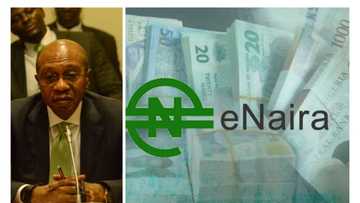UBA, Zenith, GTB, 6 Other Nigerian Banks Downgraded by Moody’s as Fraud Reports Increase by Over 200 per Cent
- Top Nigerian banks have been devalued by Moody’s, a rating agency based in the US
- The agency said the downgrade is due to Nigeria’s worsening economic outlook
- The rating follows another report that fraud via payment channels in Nigerian banks has increased by over 200 per cent
PAY ATTENTION: Click “See First” under the “Following” tab to see Legit.ng News on your Facebook News Feed!
Moody’s Investors Service, an International rating agency had devalued nine banks in Nigeria following its downward review of the country’s rating last week.
- The affected banks are:
- Access Bank
- Zenith Bank
- First Bank
- UBA
- GTBank
- Union Bank
- Fidelity Bank
- FCMB and
- Sterling Bank

Source: Getty Images
Nigeria's economic woes affecting its financial institutions
The agency downgraded the nine banks from B3 to Caa1, the long term deposit ratings, issuer ratings and the senior unsecured debt ratings, according to a statement by Moody on Tuesday, January 31, 2023.

Read also
CBN issues fresh update on Feb 10 deadline for old naira notes as Buhari calls for patience
PAY ATTENTION: Join Legit.ng Telegram channel! Never miss important updates!
A Daily Trust report said the New York-based agency stated that the devaluation of the the long term ratings of the banks shows a combination of two reasons - the weakening operating environment, reflected in the agency’s rating of Nigeria’s economy from ‘Very Weak to Very Week+, and the link between country’s creditworthiness from B3 Caa1 and the banks balance sheets based on their holdings of sovereign debt securities.
Nigeria also downgraded
Per the statement by Moody’s, the revised Macro profile for Nigeria reflected its expectation that depressed and uncertain oil production outflows in the face of flight to quality and government’s expenses will be affected.
Moody’s rating comes amid report that fraud from payment channels in Nigerian banks have surged by 208 per cent in three months.
The total amount of money lost to fraudulent transactions and activities in Nigeria has increased in the three months ending September 2022.
Top sources of fraud in Nigerian banks
The report, courtesy of the Financial Institutiosn Training Centre (FIITC) stated that the amount increased from N1.2 billion in previous quarter to to N3.6 billion in the third quarter and the amount involved went up to N9.62 billion.
The report said:
“There was an increase reported in both the total amount involved in and the actual or expected amount lost to fraudulent activities,” it said.
The e-naira is the primary source of fraud within the banking system, adding that there was sustained increase in the amount lost in bank branches, according to a report by Businessday.
Other channels of fraud in the banks are POS, ATMs, Web and Mobile bank apps.
Breaking down the report, FIITC said fraud from ATMs accounted for N222 million, bank fraud increased to N3,71 billion, mobile fraud N1.67 billion and PoS accounted to N393 million.
Top 10banks with highest customer deposits in 2022 as customers lament lopholes in Banks
Legit.ng reported that bank customer deposits by top banks in Nigeria grew by 33.53 per cent to N49 trillion in the first nine months of 2022 from N37 trillion in the year before, data extracted from the Nigerian Exchange Group reveals.
A BusinessDay report on listed banks on Nigerian Exchance Limited shows that Access Holdings, Ecobank Transnational Incorporated, Zenith Bank, UBA, First Bank FCMB, Union Bank and Sterling Bank reported the highest value of customer deposits in the first nine months of 2022.
Top Nigerian lenders are competing to attract about N2.7 trillion outside the formal sector, leveraging the six weeks window provided by Central Bank of Nigeria (CBN) to replace old naira notes.
Source: Legit.ng



